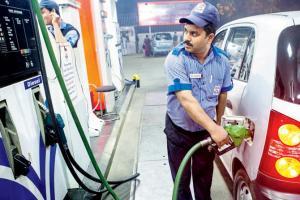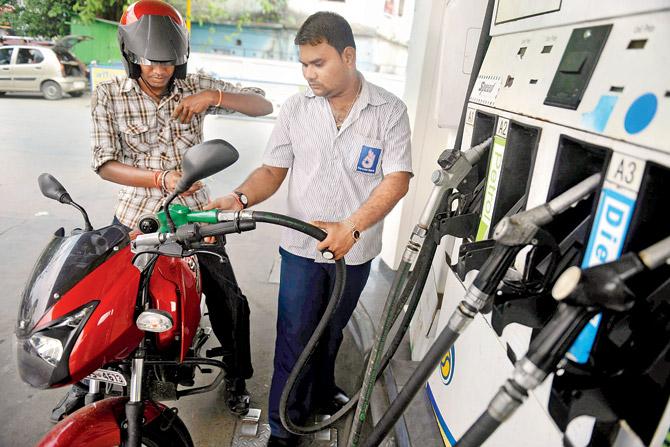As petro prices hit all-time high, experts and stakeholders urge government to impose a moratorium and bring petroleum products under GST regime to reduce rates

Various state and central taxes account for half the cost of petrol and diesel now. Representation Pic
On September 3, petrol and diesel rates hit an all-time high in the country, despite a decline in crude prices in the global market. Petrol dealers in the city blamed a triad of issues: rupee's plunge against the dollar, the US's embargo on Iran (one of India's main suppliers of crude oil) and, finally, the main culprit — taxes. The central and state taxes alone account for more than half the price of petrol, lamented suppliers.
In just a month, petrol witnessed a nearly Rs 3 rise in Mumbai, from Rs 83.76 per litre on August 1 to Rs 86.56 on September 3, while diesel too went up by Rs 3.5 (Rs 72 per litre on August 1 to Rs 75.54 yesterday).
ADVERTISEMENT
At this rate, there is a fear that prices could hit the Rs 100 mark. Ravi Shinde, former president of the Petrol Dealer Association, refused to comment on such fears, but said, "The US' sanctions on Iran have impacted direct crude supply to India. Nearly 85 per cent of our crude came from Iran, US, Saudi Arabia and Russia before the embargo was imposed. Now, India has to buy from other countries that quote higher prices. This pinching us even more because of the rupee's slide against dollar."

Fuel prices have increased despite a drop in international crude rates. Representation Pic
GST of the issue
While the Indian government has little to no control on the forex rate or on international crude supply, the authorities do have the power to provide relief by reforming the tax regime.
Shinde explained, "Our taxes [central and state] come to nearly 53 per cent of the fuel price. The government is not doing much to curb taxes, and it is the common man who is facing the brunt of it."
M Venkatrao, sitting president of the Petrol Dealer Association, associated with 250 petrol pumps in Mumbai and around 3,800 across Maharashtra, agreed that taxes on petroleum products are exorbitant, and half the money goes to fill the coffers of the state and central government. "In order to provide temporary relief to the public, the Centre should immediately put a moratorium on fuel prices, so that public anger is curtailed.
"The Centre should also persuade the states to bring petroleum products under the Goods and Services Tax (GST). Unfortunately, many of the state governments will not be willing to do this, as oil is a major contributor to the state exchequer, and changing the system will adversely impact revenue collection."
Car trade slows down
Thanks to the inflated fuel prices, the automobile industry is also running out of steam. Hormazd Sorabjee, of Autocar India, said, "Both the state and central governments impose heavy taxes on petrol and diesel, which directly correlates to a drop in car sales. The government must reconsider the taxation levied on these petroleum products , to give relief to the common man."
A senior official from a reputed car dealership agency said, "The rising fuel prices have definitely impacted car sales by 10 to 12 per cent. As diesel prices go up, more people are choosing petrol vehicles, since diesel vehicles have higher registration costs. But the most noticeable trend is the preference for CNG vehicles, as vehicle cost and taxes are lower."
He added, "The government offers international crude price hikes as an excuse, but are tight-lipped about domestic taxes. If this is not controlled, it will have serious impact on the public, as the cost of all other essential products will shoot up as well," he added.
Nitin Dossa, executive chairman of Western India Automobiles, agreed: "Even buses, taxis and trucks will get more expensive, which will indirectly increase the price of commodities and essential supplies.
"In the olden days, the Maharashtra government levied a tax of 45 paise per litre, which was later converted to percentage. Maharashtra now levies the highest tax on petrol and vehicles. But we don't see proportionate development of infrastructure. The need of the hour is improve infrastructure and find alternate modes of travel, or else we will soon face a scarcity of fuel in the nation."
Rising rates
Date Petrol Diesel
Sept 3 Rs 86.56 Rs 75.54
Sept 2 Rs 86.25 Rs 75.12
Sept 1 Rs 86.01 Rs 74.76
Aug 31 Rs 85.93 Rs 74.54
Aug 30 Rs 85.72 Rs 74.24
Also Read: AAP blames Narendra Modi government for 'economic mess'
Catch up on all the latest Mumbai news, crime news, current affairs, and also a complete guide on Mumbai from food to things to do and events across the city here. Also download the new mid-day Android and iOS apps to get latest updates
 Subscribe today by clicking the link and stay updated with the latest news!" Click here!
Subscribe today by clicking the link and stay updated with the latest news!" Click here!







